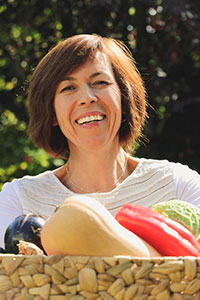
Dr. Irina Schurov is a Nutritional Neuroscientist with a PhD from Cambridge University (UK) and over 20 years’ experience in science and health-providing services. She created and founded LiveRight, an initiative to help others through nutrition and wellbeing strategies. By building an educational platform around healthy eating habits, by restoring the relationships between people and food, by supporting your individual circumstances and through personalized coaching in nutrition, she wants to help you and your family achieve the optimal balance between help and life.
Irina focuses especially on children with ASD and related neurological conditions by addressing the connection between gut and brain by detoxifying, nourishing and resetting a whole body biochemical balance. She provides personalized nutritional support to families and an individual DNA nourishing programme for each child in order to maximise their potential in life.

Photo by Oliver Hihn on Unsplash
By Dr. Irina Schurov, LiveRight
I am sure you have noticed that our days have been getting shorter and that we now experience far less sun light exposure. At this time of year lots of people start to undergo a form of seasonal blues, lack of energy and emotional slumps. People who are especially sensitive to such changes of environment can sometimes be diagnosed with Seasonal Affective Disorder (SAD). Of course, children who experience troubles with learning, concentration, sensory issues and emotional challenges will be even more susceptible to lack of day light. For example, it was shown that deficiency of sun light can potentially lead Asperger’s children to have low self-esteem, feel disappointment, isolation, mood swings and a lack of motivation. Consequently, while everyone feels the shortage of light exposure, we all tolerate and adapt to it in different ways.
From a biological perspective, as the seasons shift, our bodies experience certain biochemical changes, which are absolutely normal! Although humans aren’t as seasonal as animals and we do not hibernate in the winter, environmental changes have a clear impact on our biology!
Our master clock, located in the hypothalamus, responds to light by secreting certain hormones such as serotonin, which helps the body to feel awake, alert and satisfied. When it is dark, serotonin is converted to melatonin, making the body feel sleepy. It is for this reason that lack of day light causes hormonal imbalance, leading to many troublesome consequences, including sleep disorders, behavioral problems, hormonal imbalances and stress. To summarise; HUMANS’ ARE VERY DEPENDENT ON LIGHT!
Have you noticed that during the winter we try to compensate for our low levels of serotonin by reaching for comfort food and eating lots of carbohydrates and sweets? This gives us instant but fleeting satisfaction, which passes quickly and leaves us with long-term consequences such as elevated levels of blood glucose, extra weight, irritability and insulin imbalance.
Here is a quick check list of typical signs of SAD:
1. Depressed mood, low energy during the day
2. Anxiety or irritation, not handling stress well
3. Feeling lethargic and sleeping more than usual
4. Difficulty to concentrate and focus
5. Preferring to stay alone, less socializing
6. Craving for easy carbohydrates and sweets
7. Feeling a need for a sunlight
So, how can we prepare for this year’s winter? Here is a short list of changes you can implement into your routine, to ensure you experience a pleasant and energetic few months!

Photo credit: Patrick Fore
By Dr. Irina Schurov, LiveRight
Fruit and berry season has arrived! This is a great time of year when we can enjoy eating these fantastic nutrient-rich products and nourish our bodies with plenty of fibre, vitamins, minerals and antioxidants.
Of course, fruit is a very good replacement for pastries, cookies and other “easy carb” snacks for children. However, it is also very easy to enjoy too much fruit during the summer. Especially, if you or your child has a compromised digestive system.
With this in mind, what exactly do we need to know about fruit?
- Fruit digests quickly and is pushed from the stomach to the intestine very early on. Meals that are especially rich in protein and fibre require much more time and gastric juice to digest. For this reason, fruit does not mix very well with other food groups and can disturb the digestive process of the main meal. It is, therefore, advisable to eat fruit as a snack between meals or on an empty stomach.
- Fruit is very sweet and causes a lot of sugar to be released into the blood, leading to a spike in energy. It would, therefore, be sensible to not eat fruit in the evening when your body needs to prepare for good quality sleep.
- Fruit is rich in a type of sugar called “fructose”. Unfortunately, many people cannot digest fructose very well and, instead, absorb large amounts. Researchers showed that up to 40% of people suffer from a condition called fructose malabsorption, in which fructose is inefficiently absorbed within the small intestine due to a limited amount of the fructose digesting enzyme. It is for this reason that, instead of nourishing our bodies, sometimes fruit can simply sit in the gut and be fermented by bacteria. The result of those bacteria feasting on fructose is a lot of gas and bloating, which makes many people feel uncomfortable. Therefore, eating too much fruit at the same time can cause digestive discomfort.
- Fruit is designed by nature to carry seeds and produce new plants. So, similar to grains, fruit and berries contain certain amounts of antinutrients that can irritate the digestive system. Cooking fruit helps to avoid this effect.
- It has been demonstrated that fructose does not trigger the release of “leptin”, a hormone that signals satiety, and instead triggers the release of another hormone called “ghrelin”, a hunger stimulating hormone. That is why eating fruit makes you want to eat even more fruit. Monitoring your portion of fruit could help bring this situation back under control.
To conclude, while you absolutely should enjoy eating fruit during the summer season, please, think about when and how much of this great food you consume. Eat local, organic, fresh and very ripe fruit to gain maximum benefit from these fantastic products.
Author's Bio

Dr. Irina Schurov is a Nutritional Neuroscientist with a PhD from Cambridge University (UK) and over 20 years’ experience in science and health-providing services. She created and founded LiveRight, an initiative to help others through nutrition and wellbeing strategies. By building an educational platform around healthy eating habits, by restoring the relationships between people and food, by supporting your individual circumstances and through personalized coaching in nutrition, she wants to help you and your family achieve the optimal balance between help and life.
Irina focuses especially on children with ASD and related neurological conditions by addressing the connection between gut and brain by detoxifying, nourishing and resetting a whole body biochemical balance. She provides personalized nutritional support to families and an individual DNA nourishing programme for each child in order to maximise their potential in life.
LiveRight

By Dr. Irina Schurov, LiveRight
BBQ season has started and, for the next 3 months. we are going to be enjoying this glorious method of outdoor cooking in the company of our friends and family. Sounds wonderful!
However, I would like to remind you that BBQ food, while delicious, has its own “dark” side. Luckily, by being conscious of it, we are able to minimise any harmful impacts and really enjoy the otherwise very healthy BBQ!
So, what exactly do we need to know?
Research clearly shows that cooking meat over a flame at high temperatures can cause certain carcinogens to form. For example, AGEs (advanced glycation end-products), PAHs (polycyclic aromatic hydrocarbons) and HCA (heterocyclic amine) are all products that can cause oxidative stress, inflammation, damage to DNA and can, therefore, potentially lead to cancer. You may think this very insignificant and irrelevant to you. However, one specialised study has demonstrated that people who consume grilled, barbecued and fried meat regularly have 60% more chance to develop pancreatic cancer. The harmful chemicals produced when fat drips onto the hot coals, cause chemical reactions and toxic smoke which then contaminate the food and, through inhalation, affect our lungs.

By Dr. Irina Schurov, LiveRight
It may only be May, but the weather already feels like summer! Recently we have been blessed with beautiful sunshine and all of nature is responding with an abundance of blossom, colour and aroma! Many people are enjoying being outside meaning, of course, that the time has come to start thinking about protecting ourselves, and our loved ones, from the active sun by applying a variety of sunscreens. We think we are shielding ourselves and are doing the best for our children when we cover skin with a thick layer of sun cream. However, in truth, this isn’t quite the case. I am afraid I have to disappoint you and tell you that, actually, sunscreen is absorbed into the blood within the first few seconds of application. This makes it a huge contributor to general toxicity in the body.
First of all, sunblocks contain toxic ingredients that are endocrine disrupters, which cause many health issues including cancer, hormonal imbalances, neurological issues and behavioural problems in children. For example, many sunscreens contain the ingredient Oxybenzone, a commonly known hormone disruptor that is not recommended for use on children. It has been demonstrated that Oxybenzone has an estrogenic effect and can, therefore, promote the growth of cells, thus causing cancer.
Another harmful impact of Oxybenzone is that, by blocking all vitamin D, a vital contributor to hormone formation in the body, it causes even further endocrine disruption.

By Dr. Irina Schurov, LiveRight
The end of March and the beginning of spring have finally arrived! Nature has begun to wake up and every day new flowers, more green grass and blossoming buds on trees appear.
Now is the time for a Spring clean in the house, garden and, of course, in the body. Some people associate this with a strict diet or a liver flush. For others, who follow religious traditions and are currently fasting, this “clean” is already happening, as fasting is a very effective traditional detox programme. However, it is important to realise that detoxification processes can cause huge stress to the body and it is advisable to undergo them gently, applying a very personalised approach. Only people in very good health can go through a robust detoxification protocol, others need to be very careful! Because of the amount of toxicity and stress we experience in our lives, our body’s detoxification system is always working hard. We have a complex elimination system that is responsible for removing waste from the body. This internal system includes the kidneys, liver, lungs, skin and the gastrointestinal tract. If you have issues with any of these organs it means the detoxification process cannot be very effective! For example, if you suffer from constipation, you cannot eliminate toxins effectively, therefore, any detoxification protocol you may introduce will elevate the problems in your body even more, as it will cause the concentrated toxins in your gut to accumulate and will redistribute the toxicity in your body, potentially causing many health issues.






